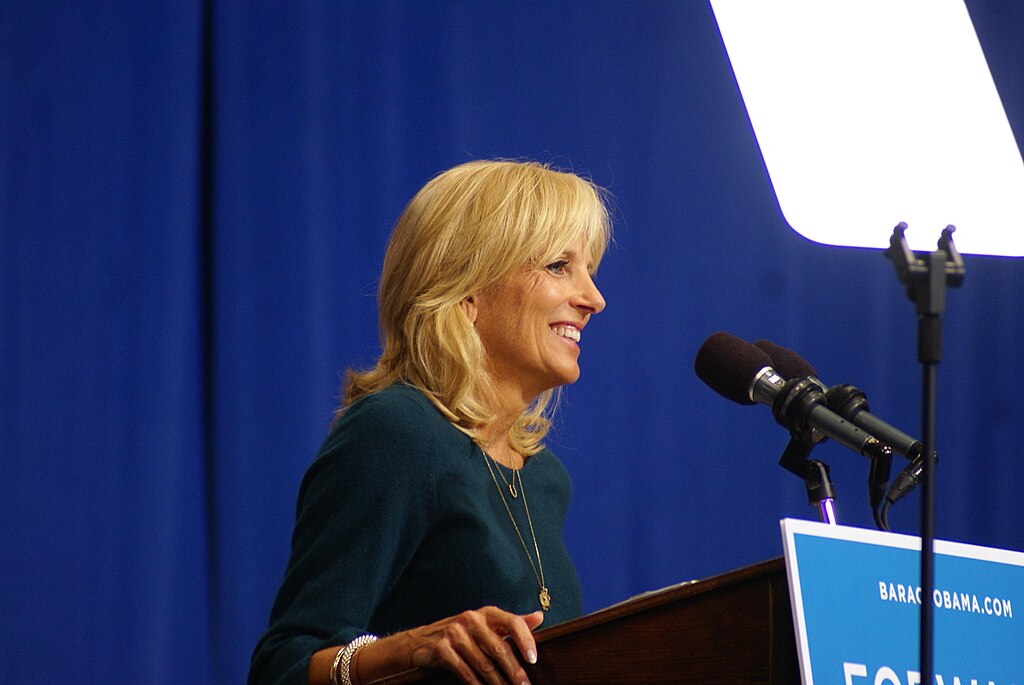During a recent holiday event, First Lady Jill Biden found herself at the center of a spirited discussion about the appropriateness of inclusive seasonal greetings. The moment unfolded when Biden addressed a crowd of children and families with a cheerful "Happy Holidays."
In response, several children in the audience reportedly replied with a resounding "Merry Christmas." This seemingly innocent exchange has reignited debates over the choice of greetings in public settings, particularly during the holiday season.
Public Reaction Highlights Cultural Divisions
The interaction, which quickly gained traction on social media, has polarized opinions. Some view it as a lighthearted moment reflecting the festive season, while others argue it underscores ongoing cultural divides over the preference for specific holiday greetings. Supporters of "Merry Christmas" emphasize the importance of preserving traditional expressions, while advocates of "Happy Holidays" champion inclusivity in a multicultural society.
Social media platforms erupted with commentary:
- @HolidayTraditionalist: "The kids saying 'Merry Christmas' is proof we’re not letting traditions fade!"
- @InclusiveHolidays: "Jill Biden did the right thing with 'Happy Holidays.' It’s inclusive and respectful to everyone."
- @FestiveDebate: "This whole thing is being blown out of proportion. Let’s enjoy the season, however, we choose!"
- @ChristmasForever: "We need to keep ‘Merry Christmas’ alive. It’s part of our heritage and spirit."
- @ModernFestivities: "This debate happens every year. Can we move past it and focus on kindness instead?"
- @CulturalConvo: "Both greetings are fine, but the backlash Jill Biden is facing feels over the top."
Cultural Significance of Holiday Greetings
Holiday greetings in the United States have long been a reflection of its diverse population. “Happy Holidays” gained popularity as a neutral phrase encompassing all celebrations, from Christmas to Hanukkah and Kwanzaa. However, “Merry Christmas” remains deeply ingrained in American traditions. These differing preferences often spark spirited debates, particularly during high-profile moments like this one.
The First Lady's Role in Setting the Tone
As First Lady, Jill Biden’s use of “Happy Holidays” aligns with her public persona of fostering inclusivity. However, the enthusiastic response of “Merry Christmas” by children underscores how traditional greetings still resonate strongly with many Americans. The incident serves as a microcosm of broader discussions about balancing respect for tradition with embracing cultural diversity.
Conclusion: A Season for Celebration
While holiday greeting preferences may vary, the overarching message of the season remains one of unity, goodwill, and celebration. This moment involving the First Lady highlights the power of simple words to spark meaningful conversations about culture, tradition, and inclusivity.



 Zelenskiy Urges Change in Iran After U.S. and Israeli Strikes, Cites Drone Support for Russia
Zelenskiy Urges Change in Iran After U.S. and Israeli Strikes, Cites Drone Support for Russia  Failure of US-Iran talks was all-too predictable – but Trump could still have stuck with diplomacy over strikes
Failure of US-Iran talks was all-too predictable – but Trump could still have stuck with diplomacy over strikes  HHS Adds New Members to Vaccine Advisory Panel Amid Legal and Market Uncertainty
HHS Adds New Members to Vaccine Advisory Panel Amid Legal and Market Uncertainty  Trump Announces U.S. Strikes on Iran Navy as Conflict Escalates
Trump Announces U.S. Strikes on Iran Navy as Conflict Escalates  Why did Iran bomb Dubai? A Middle East expert explains the regional alliances at play
Why did Iran bomb Dubai? A Middle East expert explains the regional alliances at play  Marco Rubio to Brief Congress After U.S.-Israeli Strikes on Iran
Marco Rubio to Brief Congress After U.S.-Israeli Strikes on Iran  Trump Says U.S. Attacks on Iran Will Continue, Warns of More American Casualties
Trump Says U.S. Attacks on Iran Will Continue, Warns of More American Casualties  Israel Declares State of Emergency as Iran Launches Missile Attacks
Israel Declares State of Emergency as Iran Launches Missile Attacks  Trump to Address Nation as U.S. Launches Strikes in Iran, Axios Reports
Trump to Address Nation as U.S. Launches Strikes in Iran, Axios Reports  Russia Signals Openness to U.S. Security Guarantees for Ukraine at Geneva Peace Talks
Russia Signals Openness to U.S. Security Guarantees for Ukraine at Geneva Peace Talks  Does international law still matter? The strike on the girls’ school in Iran shows why we need it
Does international law still matter? The strike on the girls’ school in Iran shows why we need it  Trump Launches Operation Epic Fury: U.S. Strikes on Iran Mark High-Risk Shift in Middle East
Trump Launches Operation Epic Fury: U.S. Strikes on Iran Mark High-Risk Shift in Middle East  Macron Urges Emergency UN Security Council Meeting as US-Israel Strikes on Iran Escalate Middle East Tensions
Macron Urges Emergency UN Security Council Meeting as US-Israel Strikes on Iran Escalate Middle East Tensions  Trump Says U.S. Combat Operations in Iran Will Continue Until Objectives Are Met
Trump Says U.S. Combat Operations in Iran Will Continue Until Objectives Are Met  AI is already creeping into election campaigns. NZ’s rules aren’t ready
AI is already creeping into election campaigns. NZ’s rules aren’t ready  UK Accepts U.S. Request to Use British Bases for Defensive Strikes on Iranian Missiles
UK Accepts U.S. Request to Use British Bases for Defensive Strikes on Iranian Missiles 































